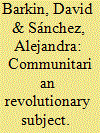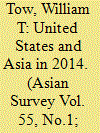| Srl | Item |
| 1 |
ID:
173444


|
|
|
|
|
| Summary/Abstract |
The hope for a unique revolutionary actor in the twentieth century evaporated as a result of the weaknesses of social organisations. This paper examines the potential of an almost-forgotten group of revolutionary actors – collectively organised and deliberately involved in processes of social and productive transformation with a legitimate claim to territory – whose present-day activities involve them in concerted processes to consolidate a different constellation of societies on the margins of the global capitalist system. Indigenous and peasant communities throughout the Americas are self-consciously restructuring their organisations and governance structures, taking control of territories they claimed for generations. They are also reorganising production to generate surplus, assembling their members to take advantage of underutilised resources and peoples’ energies for improving their ability to raise living standards and assure environmental conservation and restoration. These communities are not operating in isolation. They coordinate activities, share information and build alliances. Hundreds of millions of people are participating in this growing movement; they occupy much more than one-quarter of the world’s land area. There is great potential for others to join them, expanding from the substantial areas where they are already operational. Global social networks are ensuring that this dynamic accelerates.
|
|
|
|
|
|
|
|
|
|
|
|
|
|
|
|
| 2 |
ID:
137897


|
|
|
|
|
| Summary/Abstract |
Visible U.S. efforts to sustain influence in the Asia-Pacific met with mixed success. President Barack Obama’s visit to the region reinforced alliance commitments, but U.S. policy momentum on regional trade and diplomacy remained sluggish. Washington’s effective management of its relations with Beijing remains the key factor to how well the U.S. will fare with other regional actors and issues.
|
|
|
|
|
|
|
|
|
|
|
|
|
|
|
|
| 3 |
ID:
169024


|
|
|
|
|
| Summary/Abstract |
Development policy and practice is replete with assumptions that local “communities” have both the willingness and capability to adapt to socio-environmental changes and become “resilient” to multiple old and new challenges. This paper analyzes socio-environmental change processes in a dynamic peri-urban context in the Kathmandu Valley of Nepal, and argues that unequal power relations between diverse actors and their differing interests refute notions of “collective action” and “community resilience.” Residents of peri-urban communities are diverse, have varying abilities and interests, and use different strategies and actions in response to complex socio-environmental changes. These differences reduce insecurities for some while reproducing inequalities for others. These interrelations at the local level are driven by wider socio-economic, political, and institutional processes that transcend community boundaries, interests, and benefits. In the face of these complexities, “community resilience” is an unviable, externally defined, and engineered goal, often at odds with the power discrepancies and heterogeneity found within actual communities. These findings suggest a need to pay attention to the social, economic, and political dynamics of socio-environmental changes that simultaneously shape local communities and their members’ abilities to respond to changes at various scales.
|
|
|
|
|
|
|
|
|
|
|
|
|
|
|
|